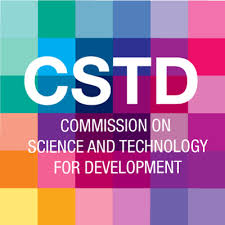Presentation of the new STI policy review framework and UNCTAD network of innovation experts
15 May 2019 16:30h - 18:00h
Event report
[Read more session reports and live updates from the 22nd Session of the Commission on Science and Technology for Development]
The session was opened by Ms Shamika N. Sirimanne (Director, Division on Technology and Logistics, Head of CSTD Secretariat, UNCTAD) who announced the launch of UNCTAD’s Technology and Innovation Report 2018: Harnessing Frontier Technologies for Sustainable Development which was created using a systems approach to innovation. Additionally, she presented the new framework for the National Science, Technology, and Innovation Policy Reviews (STIP Reviews).
Sirimanne explained that STIP Reviews were usually analysed from the point of view of economic growth and highlighted that the new framework seeks to strike a balance between growth and inclusive and environmental sustainability. She mentioned that the design of the of the new framework involved many non-economics experts and a large number of stakeholders. Sirimanne further noted that the main purpose of the new framework remains the same and that it aims to support states in identifying gaps and practical actions to follow-up on their innovation efforts, with the notable difference that this frameworks also includes provisions for sustainable and inclusive development.
Moreover, Sirimanne announced the creation of an official network of experts on the STIP called STIxNET.
Mr Adrian Ely (Senior Lecturer, Science Policy Research Unit, University of Sussex) emphasised the differences of the old STIP Review framework and the new one, and pointed out that the new framework has a policy-oriented approach and offers opportunities for reviewal and a structural transformation, with a stronger focus on the 2030 Agenda and the sustainable development goals (SDGs). According to Ely, the framework delivers pathways to ensure environmental protection and that no one is left behind. He further explained that transformative approaches require a more open and experimental outlook on policy-making.
An additional change in the framework is that actors such as firms which can influence behaviours are identified as key actors in the review mechanism, thus their assessment will be part of the overall evaluations. He also mentioned that intermediary organisations will also be taken into account given their network capabilities. Due to their ability to learn, test, and acquiring new technologies and thereby bring about wider systemic change, consumers and users as well as civil society actors will also be granted a more prominent role in the STIP Reviews. Moreover, Ely said that the framework will also rely on available indicators to perform the review beyond STI policies and to take other activities – such as social and grass-root activity and informal sector activity – into account to capture a broader picture of the different forms of innovation which may be relevant for the achievement of the SDGs.
Ely concluded by saying that the framework provides countries with the tools they need to bring their policies in line with the SDGs.
Mr Jean-Eric Aubert (Consultant) said that the new framework is a way to bring the science and technology community and top policy-makers together and create connections between the two. He pointed to the importance of having a framework in place which engages with the entire science and technology system, given that the SDGs cannot be achieved by focusing solely on individual targets. Therefore, countries must acknowledge the need to create policy conditions which will enhance the development of new technologies and innovation.
Aubert also highlighted that STIP Reviews need to be linked to the broader goals of a country’s development. He applauded the new framework for its pragmatic and modular approach which leaves room for both practical and exploratory policies.
Aubert also noted that the STIxNET contributes to the structural approach of the new framework by identifying experts on which countries can rely on and turn to for help.
Ms Yesim Baykal (Programme Officer, UN Technology Bank for Least Developed Countries) spoke about the newly created UN Technology Bank for Least Developed Countries (LDC). She explained that the organisation is trying to help LDCs build national capacities and gain access to appropriate technologies, and enable them to build capacities for innovation.
She mentioned that the bank was funded by voluntary contributions and that the organisation is needed in order to develop a new language and understanding of the challenges faced by LDCs in regards to STI discussions. Baykal said that the reviews conducted by the bank will include recommendations to strengthen policies and encourage innovation through the proposal of practical solutions.
She explained that the bank also promotes access to knowledge through its digital access to research project. The project will be extended to involve focal points to instruct the trainers of digital research techniques. Additionally, the bank plans to work on the capacity-building of LDCs to help them self-identify their needs, and train them on protecting their citizens’ intellectual property rights in an attempt to foster local innovation.
By Cedric Amon
Related topics
Related event

22nd Session of the Commission on Science and Technology for Development
13 May 2019 16:30h - 17 May 2019 16:30h
Geneva, Switzerland
